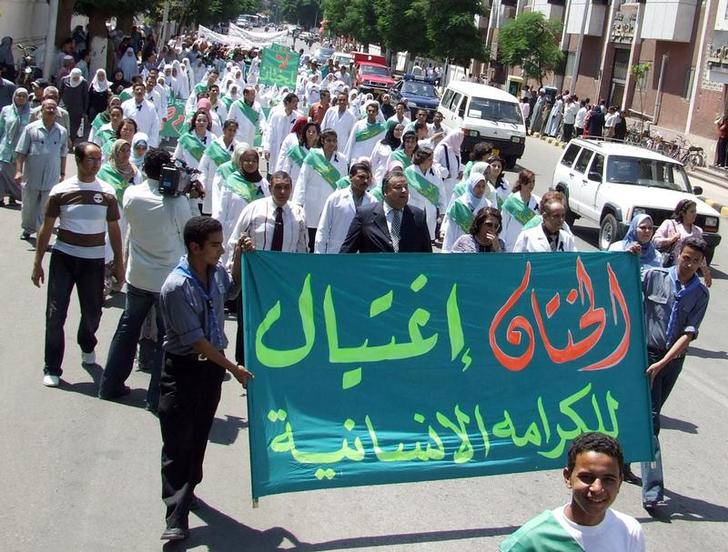Latest NEWS
- Aswat Masriya, the last word
- Roundup of Egypt's press headlines on March 15, 2017
- Roundup of Egypt's press headlines on March 14, 2017
- Former Egyptian President Hosni Mubarak to be released: lawyer
- Roundup of Egypt's press headlines on March 13, 2017
- Egypt's capital set to grow by half a million in 2017
- Egypt's wheat reserves to double with start of harvest -supply min
- Roundup of Egypt's press headlines on March 12, 2017
Female genital mutilation trial postponed to June

Protesters carry a banner condemning circumcision during a demonstration in the southern city of Assuit, 500 km (310 miles) south of Cairo, July 5, 2007. The Arabic script on the banner reads: "Female genital cutting is an assassination of human dignity." REUTERS
By Abeer Salah
An Egyptian court postponed on Thursday the female genital mutilation trial of a doctor who had preformed the surgery on a teenage girl that led to her to death to June 19.
Sohair al-Bata'a, 13, died in June 2013 at Raslan Halawa's private medical clinic while undergoing an FGM operation at her father's request, who is also standing trial.
This is the first trial of its kind since Egypt banned the practice in 2008.
Halawa has denied carrying out FGM. Instead, he stated that the victim suffered from “excess” skin which he had removed by cauterization. He insisted that she died because of an allergic reaction to the anesthetic medication.
The coroner, assigned by the Public Prosecution, held the doctor responsible for failing to test Bata'a for allergic reactions. However, he reported that medical intervention to remove “excess” skin was “right”.
Based on the results of the investigation, the doctor was charged with wrongful death. He was also charged, along with the father, with performing FGM and referred to trial.
The punishment for performing FGM is a prison sentence ranging from three months to two years or a fine of 5,000 Egyptian pounds.
At least 91 percent of Egyptian females in the age group 15-49 have undergone FGM, according to the 2008 census. Although doctors now perform 70 percent of these operations, traditional midwives and health barbers usually carried out the practice.










